(The venue-building fever in Beijing is not confined to giant palaces of culture (China National Centre for the Performing Arts) or sports/pop (Wukesong Arena in the university-filled Haidian District). The “reform and opening up” of the cultural sector has allowed the flowering of independent intimate venues as well. I’ve asked my Beijing-based colleague Alison Friedman to blog about one of the newest, the Peng Hao Theatre. —Cathy Barbash)
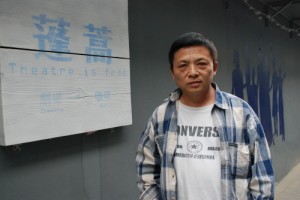 What do dentistry and theater performance have in common? Besides the sadistic “Dentist” from Little Shop of Horrors, (or the fact that when done badly, both subject one to torture willingly paid for) it would seem not very much. For Beijing’s Dr. Wang Xiang (pronounced “She-ahng”), however, the two vocations have become the warp and weft of his existence. Despite the success of three private dentistry clinics, he felt his life—and Beijing’s theater scene—was lacking something, so he decided to use the success of his clinics to fund a new theater and café space to encourage small-scale intimate performances in the center of Beijing. Tucked in a hidden alley behind the government-run Central Academy of Drama, Peng Hao Theater regularly packs the house and in less than a year of existence has become one of the new “hot spots” for contemporary and experimental performance in Beijing. Alison Friedman spoke with the good doctor to ask him why a theater, why now, and what difficulties he encountered along the way.
What do dentistry and theater performance have in common? Besides the sadistic “Dentist” from Little Shop of Horrors, (or the fact that when done badly, both subject one to torture willingly paid for) it would seem not very much. For Beijing’s Dr. Wang Xiang (pronounced “She-ahng”), however, the two vocations have become the warp and weft of his existence. Despite the success of three private dentistry clinics, he felt his life—and Beijing’s theater scene—was lacking something, so he decided to use the success of his clinics to fund a new theater and café space to encourage small-scale intimate performances in the center of Beijing. Tucked in a hidden alley behind the government-run Central Academy of Drama, Peng Hao Theater regularly packs the house and in less than a year of existence has become one of the new “hot spots” for contemporary and experimental performance in Beijing. Alison Friedman spoke with the good doctor to ask him why a theater, why now, and what difficulties he encountered along the way.
AMF: What inspired you to create the Penghao Theatre?
Dr. Wang: Because there are not enough small theaters in Beijing. I’ve been to American and Europe. There 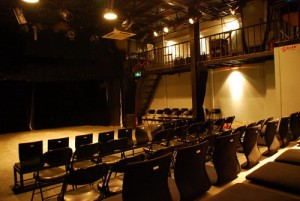 are over 1000 small theaters in New York City. Beijing just has five or six, and this already is a lot for a city in China. I’ve done some calculations: In one year, I calculated that if one theater in New York City has 100 people a day, across 1000 theaters that is 100,000 people a day, and in one year that’s almost 36,500,000 theater-goers seeing performances. Watching performances affects them, what they talk about, their development and psychological nutrition, their energy, their spirit. This benefits the level of richness and diversity of their creativity, their economic output and consumption, an individual’s charm, a family’s happiness, hell even the quality of one’s love making!
are over 1000 small theaters in New York City. Beijing just has five or six, and this already is a lot for a city in China. I’ve done some calculations: In one year, I calculated that if one theater in New York City has 100 people a day, across 1000 theaters that is 100,000 people a day, and in one year that’s almost 36,500,000 theater-goers seeing performances. Watching performances affects them, what they talk about, their development and psychological nutrition, their energy, their spirit. This benefits the level of richness and diversity of their creativity, their economic output and consumption, an individual’s charm, a family’s happiness, hell even the quality of one’s love making!
Because there are so few theaters in Beijing, all these talented performers have to book a space at least a year in advance. There are too few opportunities for artists to perform. This was unbelievably depressing for me, this atmosphere felt repressed. Like America’s civil rights, there is a right to pursue happiness, not just material wealth but spiritual wealth, to protect against not just material but spiritual lack – I felt I suffered from this lack in my life. This lack made me feel stifled, choked, suffocated, so I wanted to lash out against this suffocation. Not just for me but for more people. So I thought, do I make performances, or do I create a venue to allow even more people to create and see theater? Which would reach more people and have the larger impact? I decided it was more important to create a theater venue.
Q: What does “Peng Hao” mean and why did you choose this name for your theater?
A: “Peng Hao” comes from the first line of a Li Bai poem. A “peng hao” person is an ordinary, average person. I named my theater this because I think it should be any average person’s right to walk into a theater and enjoy a performance.
Q: Why didn’t you just do theater from the beginning? Why dentistry?
A: I loved literature since I was little. I loved theater. I saw a lot of Soviet theater performances and read a lot of plays. But at that time in history, the Cultural Revolution, universities were closed and I didn’t have other 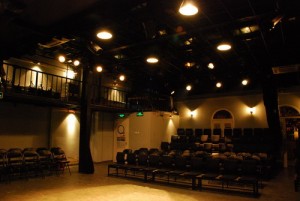 choices. I only had two: one was to go to the countryside to work with the peasants; the other was to join the army. I chose to join the army and from there I registered for university but at that time they didn’t have any performance colleges in the army, only government and engineering colleges. The best program of study was medicine, so I chose that. After university I got my MA, the first generation of masters in dentistry. I was the first dentist in China to implant artificial teeth, denture implants. So I was very successful and highly regarded. I worked in the National Navy Hospital for many years, one of the best and largest in China, and then in 1996 started setting up my clinics, the first privately-owned dentist clinics in China.
choices. I only had two: one was to go to the countryside to work with the peasants; the other was to join the army. I chose to join the army and from there I registered for university but at that time they didn’t have any performance colleges in the army, only government and engineering colleges. The best program of study was medicine, so I chose that. After university I got my MA, the first generation of masters in dentistry. I was the first dentist in China to implant artificial teeth, denture implants. So I was very successful and highly regarded. I worked in the National Navy Hospital for many years, one of the best and largest in China, and then in 1996 started setting up my clinics, the first privately-owned dentist clinics in China.
Q: When did Peng Hao Theater open? Why did you do it when you did it? Was it just the right time personally, or did you feel Beijing in general was ready for such a place?
A: I officially registered the theater on September 25, 2008 but we didn’t receive our performance permit until February 17, 2009.
I chose to do it when I did for two reasons, one personal and one having to do with the larger context in Beijing. A few years ago, I just loved to watch theater. I would see 400-500 performances a year, I saw the National Theater Company of China’s performance of Copenhagen over 30 times! I also started an amateur drama club to put on free performances. We rehearsed in my house and I funded everything. At that time I hadn’t thought to build a theater because I didn’t think there was a need, the theaters weren’t booked. Now, there are even more shows that want to be performed but not more spaces. So I felt there was more of a need.
Then my own need became stronger over the years and I couldn’t wait any longer. I was lonely. I had this 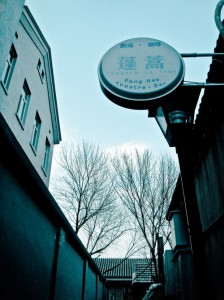 dread that society was getting more and more materialistic and shallow. This is the 60th anniversary of the founding of the People’s Republic of China. With the founding, they brought both good and bad. On the one hand, they tried to feed the people who were starving, but the restrictions killed their spirits. After the reform and opening in the 1970s and 80s, China became the world’s factory. It became more prosperous. More people could eat their fill, their material needs were satisfied, but this brought new problems. In order to make sure they could feed the people, the People’s Republic of China had created a system of controls that limited other aspects. Now in this lacking situation, all these material things came in, took up even more inner spiritual space, making it even smaller. Materialism made people even more personally deficient.
dread that society was getting more and more materialistic and shallow. This is the 60th anniversary of the founding of the People’s Republic of China. With the founding, they brought both good and bad. On the one hand, they tried to feed the people who were starving, but the restrictions killed their spirits. After the reform and opening in the 1970s and 80s, China became the world’s factory. It became more prosperous. More people could eat their fill, their material needs were satisfied, but this brought new problems. In order to make sure they could feed the people, the People’s Republic of China had created a system of controls that limited other aspects. Now in this lacking situation, all these material things came in, took up even more inner spiritual space, making it even smaller. Materialism made people even more personally deficient.
I like to see people expressing themselves, this is the most beautiful thing. I don’t want to see so much materialist consumption, eating, drinking, buying cars and houses… I hope even more people can go see theater, this will enrich their spirits! And I won’t be lonely then. I’ll find people who care as much about theater as I do!
Q: Have you funded this theater by yourself, or with other investors? How much did it cost to build the theater, and what is its current operating budget? Do you have an additional budget for presentations?
A: Before I built this, China didn’t have any privately-owned theaters. There were theaters that individuals had built like Southgate Space in 798, but they weren’t able to fill the theaters with performances, and they were too far from city center. They didn’t last. Peng Hao Theater is Beijing and probably all of China’s first privately-owned, privately run, professional theater providing performances for society.
It’s entirely self- funded. I paid 1,200,000 RMB (approx. USD 175,008) to build it, including renovation, installing the lighting grid, buying all of the light and sound equipment. I have no co-investors; this was all my personal money I have earned from my dentist practice. Our annual operating budget is around 500,000 RMB (approx. USD 73,000), which includes rent at 300,000 RMB (approx. USD 44,000) a year, plus utilities, salaries for my employees, etc. It would have been 10,000,000 RMB (approx. USD 1,458,400) to buy the place so I did not buy, I rent instead.
For productions, there are different arrangements. Some we co-produce, we invest. Another option is we split ticket sales with the performing group or individual. Our income will not cover operating costs, so I’ll have to add 100,000-200,000 RMB (approx. USD 14,500 – 31,000) each year to cover the deficit.
So this is really non-profit. Even though we sell tickets and we’re not officially registered as a non-profit, in reality we are non-profit. I’m registered as a private enterprise because only recently has China allowed arts institutions to register as non-profit and the laws are not very clear or stable. So I went ahead and registered as a private enterprise. On top of all the costs I mentioned, I still have to pay commercial taxes!!!
Today I was an hour late for your interview because I was taking care of applying for government funding to the Beijing Municipal Propaganda Department and also the Beijing Municipal Cultural and Creative Industries Development Fund. I just sent my materials to them today, to apply for their support. So right now they aren’t helping but I’ve just applied.
China doesn’t have any foundations to support theaters and arts organizations, so I hope any American foundations reading this interview can support my theater! I believe it’s more interesting and meaningful to support a theater, not a one-off performance, as a theater can have a long-term impact!
Q: What steps did you have to follow to get its construction and operation as a venue approved?
A: It was extremely difficult to set up! It took me a year to find the proper space. It’s just so difficult to find available space in Beijing, everywhere is too crowded! Out in the 798 Art District there is space but it’s too far away. I strongly believe the city center must have culture, but it’s already so crowded!
I went up and down this street [Nan Luo Gu Xiang] knocking on doors, asking if any spaces were for rent. Once I found this space, it took me six months to renovate it. Then there were all the permits and paperwork – paperwork for the Ministry of Industry and Commerce, for the ministries that cover health code regulations, fire hazard regulations, the paper work for the Ministry of Culture…. It took me six months. I legally registered on September 25, 2008 and I received my final permit to allow me to host performances on February 17, 2009. So the process from my decision to open a theater until the day it actually opened took two years.
Q: Do operations of the attached bar help subsidize the operation of the theater space? Do you anticipate the theater will ever be self-supporting?
A: I wanted this theater to encourage audiences to stay after seeing a show to talk. This way the experience could last longer. After you are moved by a performance, you stay and keep talking about it. That’s why I wanted the café. Also to help with income. It helps a little.
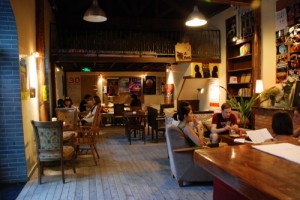 There may be a day I don’t have to add money to make up the deficit, but it will never make a profit. That’s just the nature of small theater in any country. But why do people keep doing it? Because it’s the most wonderful thing. It’s a need like the need to eat.
There may be a day I don’t have to add money to make up the deficit, but it will never make a profit. That’s just the nature of small theater in any country. But why do people keep doing it? Because it’s the most wonderful thing. It’s a need like the need to eat.
Q: Tell us about the theater itself. How many seats? Ticket prices? What percentage are your own presentations, what percentage rentals?
A: 60-120 seats depending on how they are arranged and how big a performance space is needed. Tickets cost anywhere from 50 to 100 RMB (approx. USD 7-15), depending on the show. About one third of the shows I produce myself, one third are straight rentals, and one third we split box office to cover production costs. These three different methods are unique to my theater. All other theaters in Beijing are just for rent, they don’t self-produce. Of the productions, I’d say about 60% are theater; 20% modern dance; 20% chamber music.
Q: What are the rental rates? Are they sliding rates, depending on who is renting?
A: There are three options:
1. Rent the space for 2000 RMB (approx. USD 290) per performance.
2. No rental and we split the ticket sales 50/50.
3. Rent the space for 1000 RMB (approx. USD 145) per performance and we split ticket sales 30/70 (us/them).
Q: Who runs the venue and how can someone interested in renting it contact that person?
A: My co-producer, Liang Dan Dan (Jennifer Liang) and I run the theater, along with two or three office and café employees. In the morning I stop by each of my three dentist clinics. My assistant doctor and the head nurse and different doctors are all quite stable, they don’t need me there all the time. So my mornings are there, afternoon and nights at the theater. Sometimes after a performance we still have production meetings to discuss a script or something, so by 1 or 2am I’m finally done. But the next day at 8am I still have to go the dentist offices.
Interested people can email Jennifer: jenniferliang@sina.com, she speaks English. If they read Chinese, they can visit our website at www.penghaoren.com. We will have an English website soon.
Q: What are your aspirations for the venue for the future? Do you plan to create more new small (or larger) venues in Beijing (or other Chinese cities) in the future?
A: I hope we can have even better performances and even more performances. I hope we can receive government and foundation support. If we have this kind of support, and more audiences who are willing to pay for tickets to see theater, then I’d love to open another one, maybe a larger theater, still in Beijing. I also hope to keep helping the better performances go elsewhere to continue to perform. I will sponsor/produce their tours to other theaters after Peng Hao.
Q: What have been your greatest challenges in creating and operating the Penghao, and what your greatest satisfactions?
A: Finding a location was really a huge challenge. I didn’t want to leave city center, but these spaces are too crowded. So it was the first difficult challenge, it took me an entire year to find an appropriate place! The next challenge was designing the style and feeling. This is the first theater designed from a courtyard; I kept the outer structure then built into it. This is the first in the world making a theater out of a courtyard. This is one of my great satisfactions. The application and bureaucratic procedures are too complicated, especially for the performance permit from the Ministry of Culture. Then all the health codes, fire safety codes, passing those, there used to be no standards for fire safety codes. Those were a huge challenge. Before there were no private spaces that applied for a legal performance permit, the other theaters were commercial or government. The Ministry of Culture had never before granted a performance license to a private theater before. I’m the first. This is one of my largest satisfactions.
Q: Are there things you would do differently? Do you think other people will follow your model?
A: If I had it to do over ten more times, every time I would still do what I’ve done, choose to create Peng Hao Theater to bring more performances to more people. I think lots of people will follow my model, they’ll want to do this, but I don’t know if they can do it, because it’s really just so hard.
| Photos courtesy of Peng Hao Theatre. |